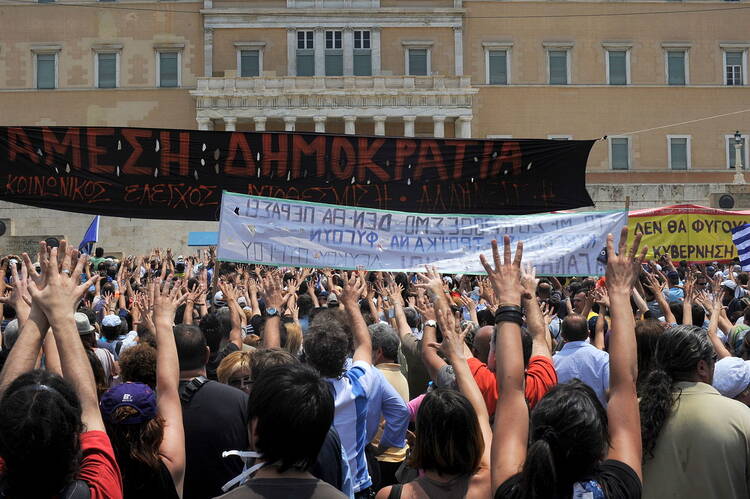It wasn’t a poutine-induced hallucination. A couple dozen police cars were racing down the street outside the Montreal restaurant where we had scored window seats for lunch. They were accompanied by several gaudily painted charter buses, the kind you often see in the U.S. bringing retirees to casinos for the day, with small stickers on the sides reading POLICE—apparently ready to cart off troublemakers. After the police had closed off a section of Ste. Catherine Street, the marchers (or la manifestation) arrived, a few hundred strong on a sunny but still frigid Saturday in early spring.
My friends and I were startled, but we discovered that the march was small potatoes (petites frites?) compared with the demonstrations that have been going on in Montreal for more than the past week. The protests, centered at the University of Quebec at Montreal, are against the Liberal Party-led provincial government’s proposed cuts in health and education spending, which include the trimming of pensions for public-sector workers.
Our waiter didn’t seem interested in the Saturday noontime march, giving us a terse explanation—“students”— when we asked what was going on. We had to figure the context out from the small picket signs in support of les âgées (senior citizens, or perhaps those who will someday be senior citizens) and comparing l’austérité to l’enfer (hell).
The anti-austerity demonstrations would be huge, round-the-clock news if they happened in a major American city, with TV reporters posing as if they were in war zones, but Montreal hardly seemed gripped by fear. Friday night’s downtown demonstration involved thousands and caused riot police to break out the tear gas, but Saturday-afternoon newscasts were dominated by the demise of Future Shop, a chain of electronics stores absorbed by Best Buy. In Montreal, at least, the loss of a Canadian brand to U.S. behemoth is a greater cause for anguish than college kids making some noise and inconveniencing some motorists.
Taking political expression to the streets is not so acceptable in the United States. We associate protest with intense anger, which is understandable given the recent demonstrations against excessive police force and racial profiling. In fact, the citizens of Ferguson, Missouri, had good reason to march in their streets long before the killing of Michael Brown, but American media and political leaders tend to view street protests with suspicion and fear. Only when there's a sensationalist event like the killing of a teenager do some of us grudgingly accept that some banging of pots and pans is understandable. (At best, something like last year’s march in New York demanding a response to climate change gets respectful coverage in some partisan media, along with amused condescension from mainstream outlets and outright contempt from the opposition.)
It’s difficult to imagine anti-austerity protests becoming as common in the United States as in Canada and Europe. If the president and Congress were to, say, reach an agreement on raising the retirement age to 75 and abolishing school lunch programs, I’d expect a few protest banners to be unfurled in major cities, but other democracies would probably be astonished at how meekly we’d accept such changes. For almost all of us, our Saturday afternoons would remain blissfully quiet.








